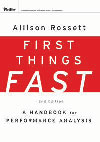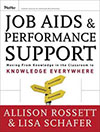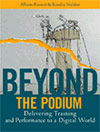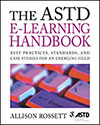In September I attended the eLearning Guild’s new conference, Performance Support Symposium. Ontuitive’s Bob Mosher kicked it off with a mighty bang, offering the jaw-dropping suggestion that we cast off training in favor of performance support.
Like Bob, I am hooked on performance support. In the 80s, I wrote a book about job aids. More recently, I wrote another, this one called Handbook for Job Aids and Performance Support. This thing I have with performance support (PS) is a long-term relationship.
My bond with training and development is just as deep. It began with a few years as a high school English teacher, then several decades as professor of instructional design and technology at SDSU, all the while occupied with consulting engagements about adoption of technology, sales training and leader development.
Let’s make a match
I don’t want to kick training to the curb. Instead, I want to bring PS and training together. Why?
You have to know something to effectively use performance support for matters of meaning. Take knowledge workers like doctors and Army captains. Their education is substantial, with significant investments in moving smarts into their minds, hearts and bellies. Let’s presume these doctors and captains know their stuff. Would the savvy ones have reason to turn to performance support? Of course. Things change. There is so much to know. An error can be catastrophic.
Consider physicians. The PDR (Physician’s Desk Reference) is an example, as are mobile checklists used in operating rooms, and even expert networks turned to when something unforeseen happens in surgery. Could just anyone use those tools to diagnose illness, avoid negative drug interactions or successfully complete the surgery? I doubt it.
Humility about transfer is in order.Training, of course, is an investment that most companies would willingly make, for example, for their mutual fund managers tasked with deciding which stocks to buy and sell.
Alas, transfer, for fund managers– and everybody else– is by no means certain. Only 25 percent of business managers reported that training and development contributed measurably to business performance, according to McKinsey’s Aaron DeSmet, Monica McGurk, and Elizabeth Schwartz. Roy Pollack and Andy Jefferson, from 6Ds Company, asked over 1,000 learning leaders to estimate the percentage of trainees who use what they have learned long enough and well enough to improve performance. The leaders’ estimates routinely average 15 percent!
What can we do about these grim figures? Performance support is one good answer. <more on the relationship between training and PS now available on a sister blog>






Allison, I love your comment, “I don’t want to kick training to the curb.” Performance support is essential for any organization, but so is capability building. Plenty of today’s training can be replaced with performance support tools – but not all of it. You can’t learn French by taking a phrase book to France. You have to put the work in first and keep your phrase book as a performance support tool.
Great posting! We’re having this discussion at work. I don’t think we cant replace one for the other, we need both of them to support learning/performance.